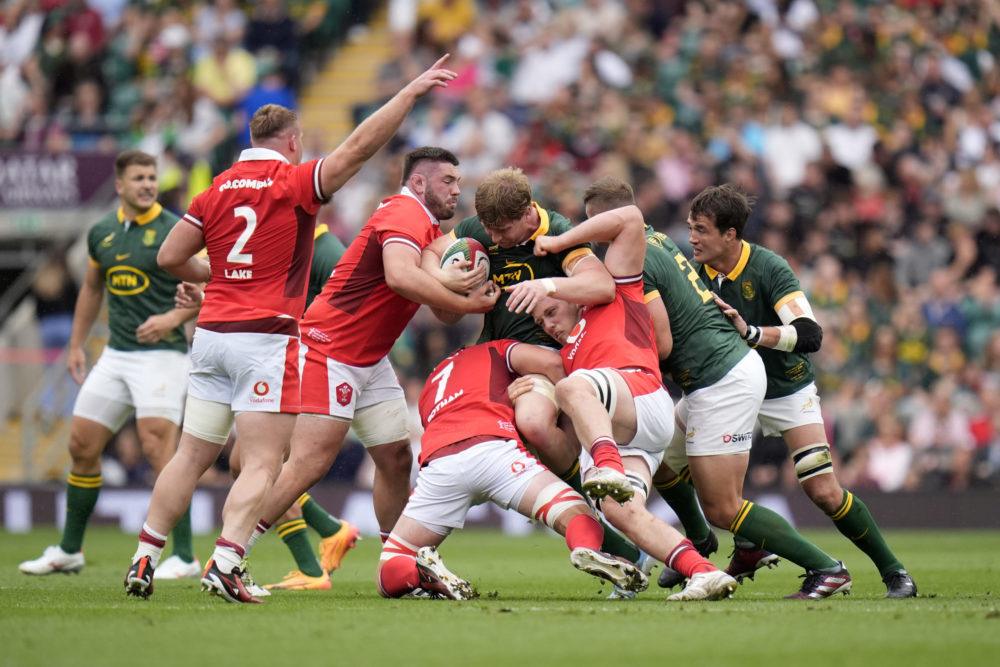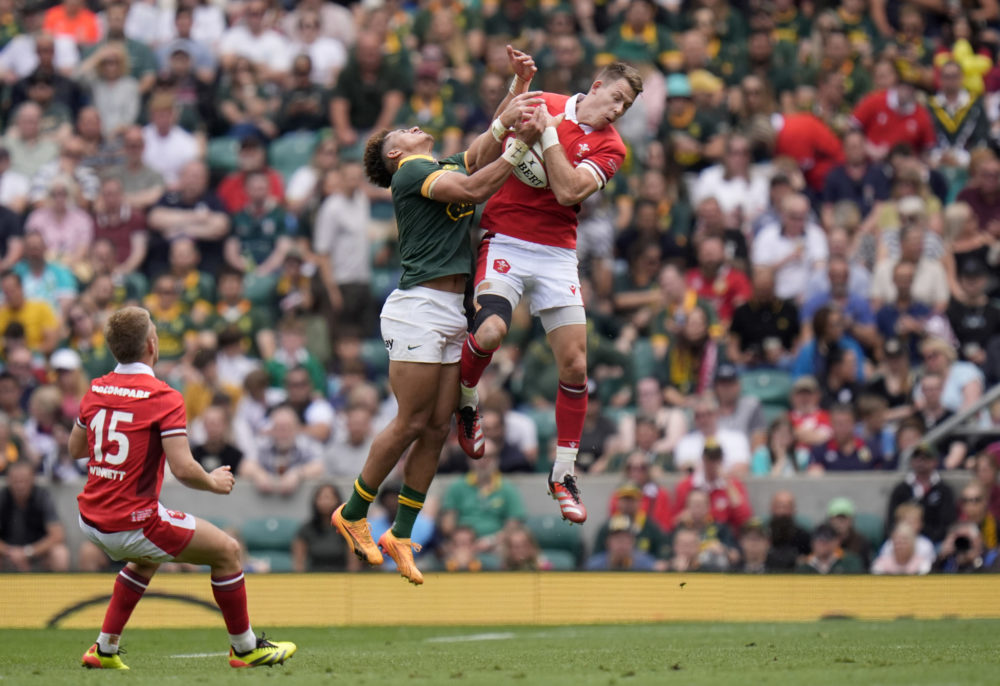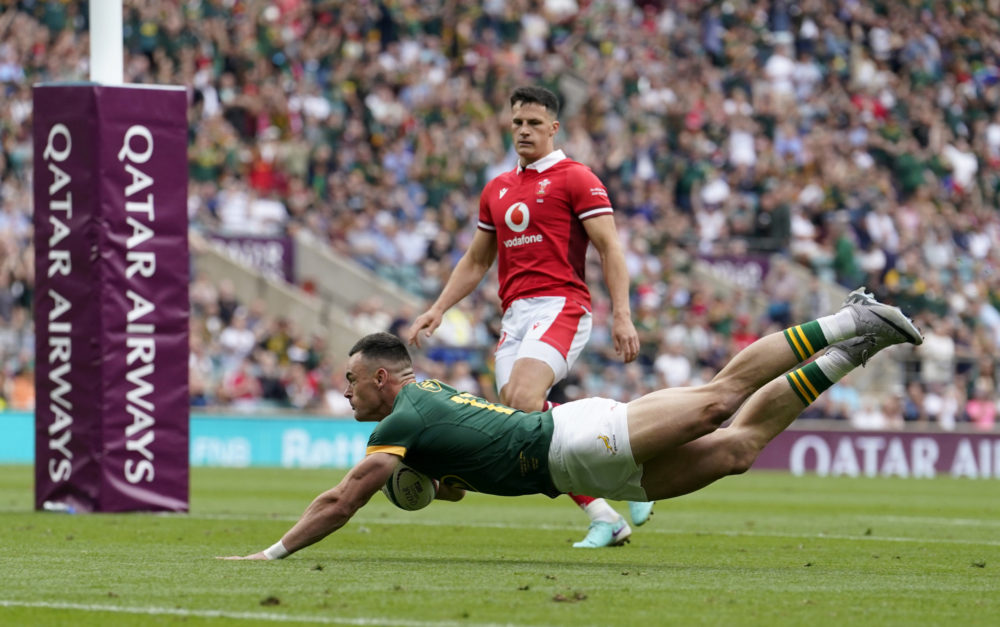Depleted Wales were brave but need to show a big improvement ahead of Australia tour

Simon Thomas
It was a fixture people had questioned the wisdom of and feared the very worst about.
The pre-match points of contention had been strongly voiced. Why take on the world champions when you are without so many of your front-line players? Why play in Twickenham?
So, in the final analysis, was it worth it – from either a financial or a rugby perspective?
Let’s deal with the cash question first.
Everyone accepts Welsh rugby is desperate for additional income. It’s with that in mind the WRU have arranged a series of high-profile concerts at the Principality Stadium this summer, leaving the ground unavailable for rugby.
At the end of the day, it’s pretty much guaranteed revenue against uncertain revenue, with Wales not exactly the biggest draw after a Six Nations whitewash.
You could look to stage a “home” fixture elsewhere, but that presents issues in terms of hiring costs and likely attendance. The bottom line is the figures don’t really add up.
Income
Yet the view within the corridors-of-power was that Wales needed a warm-up match before their tour of Australia and one that would generate some much-needed income.
So, when the opportunity to face the Springboks at Twickenham came along, it ticked both boxes.
There were none of the financial risks associated with putting on a game outside of the country, as South Africa were the home team.
By taking on the fixture, the WRU would receive a participation fee and a cut of the overall gate receipts.
We don’t know how much that will amount to, but with more than 65,000 tickets sold for a double header that also featured Barbarians v Fiji, hopefully it will have been a reasonable pay day.
Then you come on to the rugby side of things.
Throughout his two tenures as Wales coach, Warren Gatland has consistently stressed the benefit of playing against the top southern hemisphere teams as often as possible.
The logic is you only get better by taking on the best and the Springboks are certainly the best, having won successive World Cups.
But then that does bring you back to the question of whether it was wise to face them when you are missing so many players?
Depleted
On that point, it’s fair to say the WRU and Gatland wouldn’t have expected to have been quite so depleted as they were.
They knew they wouldn’t be able to call on their English-based players – the likes of Daf Jenkins, Tommy Reffell, Dillon Lewis, Christ Tshiunza and Nick Tompkins – as the game fell outside the official Test window.

But what really compounded the situation was a catalogue of injuries which also ruled out star names such as Jac Morgan, Tomos Williams, Adam Beard, Elliot Dee and Taulupe Faletau, with Will Rowlands, Josh Adams, Ryan Elias, Gareth Anscombe and Teddy Williams further absentees, along with the retired George North.
To add to the casualty list, experienced Scarlets-bound tighthead prop Henry Thomas damaged his foot after being named in the starting line-up, forcing his withdrawal.
Then came the news that Ospreys hooker Sam Parry had left the camp, amid reports that he felt “disrespected”.
All in all, it was hardly the ideal preparation for taking on the Springboks.
Seriously inexperienced
With so many players unavailable, Gatland was left to field a seriously inexperienced team, with four debutants in the match-day 23 and eight more of those on duty having six or less caps.
The situation was best illustrated by the fact the pack he originally selected totalled 118 caps, whereas opposing second row Eben Etzebeth had 119.
Now, admittedly, the ‘Boks were missing big names too, such as Siya Kolisi, Cheslin Kolbe, Handre Pollard, Willie le Roux and Steven Kitshoff.
But their huge strength in depth enabled coach Rassie Erasmus to pick what was still a seriously imposing and quality line-up.
It meant Wales were facing a mighty challenge amid public fears of a cricket score.
So, how did they get on?
Well, 15 minutes into the contest, it looked as though things were going to be even worse than anticipated.
They were already trailing 14-3 and down to 13 men with winger Rio Dyer and No 8 Aaron Wainwright both in the sin bin.
This could get really nasty.
Stirring
Yet for the remainder of the half, Wales defied the odds in stirring fashion.
They held firm during the double sin-bin period and then shocked the ‘Boks with a try of their own on the half hour mark.
It looked as though the attacking opportunity had been lost when skipper Dewi Lake had his lineout throw picked off by Etzebeth, but the hooker more than made amends as he pounced on the resulting aerial deflection and bumped Faf de Klerk out of the way to reach the whitewash.

With Sam Costelow landing the conversion from wide out, the deficit was reduced to 14-13 and that’s how it remained up to half-time.
It could have been even better for Wales had Ellis Bevan and Cam Winnett been able to hold on to potential scoring passes, but the pop-up from Mason Grady went behind scrum-half Bevan, while the side-door offload from Liam Williams was just too high for Winnett to take.
Nevertheless, it had been a real gutsy, spirited effort from the unfancied men in red who had fronted up physically either side of the ball, with captain Lake leading the way.
It was much better than anyone could have realistically hoped for and very encouraging.
Yet, it was to be a different story after the break as Wales went down to a seventh straight defeat.
South Africa scored within 90 seconds of the restart – albeit via a pass that looked suspiciously forward – and were to rattle up 27 unanswered points as they finished with five tries in all.
Two of their touchdowns – from centre Jesse Kriel and wing Makazole Mapimpi – were disturbing in terms of the ease with which they were executed, with pretty basic passing out to the left managing to expose the narrowness of the Welsh defence.
There were also two scores off lineout drives, while the coup de grace was provided by electric winger Edwill van der Merwe who picked up the Man of the Match award on debut.
Penalties
For all they were brave and did put their bodies on the line, Wales missed 21 tackles in all, while they conceded 15 penalties.
A number of those offences came at the scrum, which was also a problem area – no great surprise given the presence of Ox Nche, Vincent Koch and Frans Malherbe in the opposition propping pool. That’s one hard day at the office.
But the biggest issue – especially after the break – was Wales’ paucity in attack.
Only once did they threaten to score, when Lake was narrowly denied a second try after peeling off a lineout maul.
Apart from that, they offered next to nothing offensively.
Their default position was to kick. Now there’s nothing wrong with that in theory. The best teams in the world kick loads.
But the difference is they kick well and with a concerted and effective chase. South Africa – who kicked out of hand 22 times compared to 23 by their opponents – demonstrated as much, dominating the aerial battle overall.
In contrast, Wales kicked aimlessly or inaccurately and generally failed to win the kick-to-compete contest.
Then, on the few occasions when they opted to keep the ball in hand and go through the phases, they were unable to get anywhere and ended up kicking once more, again with no real success.
During the course of the 80 minutes, they made only one clean break and beat just six defenders. You are not going to win matches with those stats.
Structure
There was no creativity or invention in attack, no penetration, no spark and no structure. It was a hard watch, if truth be told.
On the plus side, there were some individuals who showed up well.
Lake couldn’t have done any more to lead by example, with Gatland hailing him as “outstanding” and “exceptional”, while Taine Plumtree really looks the part at No 6 with his physicality, dynamism and particularly his defence, both in one-on-one tackles – 13 with no misses – and at maul-time.
It was also good to have Liam Williams back in the fold on the wing. He may be 33 now, but he remains a class act.
In addition, second row Ben Carter delivered a big shift on his return to the international stage, putting in more tackles (16) than anyone else on the field.
Fellow Dragons forward Aaron Wainwright made the most metres (38) for his team, while scrum-half Bevan gave a decent account of himself on debut up against Faf de Klerk.
But from a collective perspective, there is need for significant improvement ahead of the tour of Australia and there’s not too much time.
There are also ongoing injury issues, with prop Keiron Assiratti the latest casualty, having been forced off just before half-time to exacerbate the tighthead crisis.
Gatland clearly feels the game did serve a purpose as he insisted there were “lots of good things and lots of positives to build on”.
Well, you would have to say that building project looks a pretty major one.
Support our Nation today
For the price of a cup of coffee a month you can help us create an independent, not-for-profit, national news service for the people of Wales, by the people of Wales.







Brave is not the word I would use for a side who gets beat by 30 point